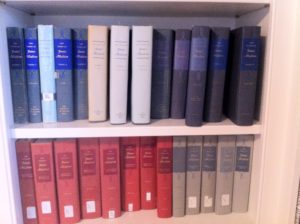Reading Madison's Mail

A partial set of the published volumes of Madison’s correspondence — only the ones I bought secondhand.
Bulletins from the frontiers of research:
- When it came to negotiating the Louisiana Purchase, American diplomats James Monroe and Robert Livingston sewed up the deal in a couple of weeks. When it came to squabbling over credit, the two diplomats spent eighteen months writing backbiting letters to James Madison (Secretary of State) explaining in excrutiating detail how the other guy almost killed the deal and how the letter-writer singlehandedly saved the day.
- Charles Pinckney of South Carolina, a lightly-regarded American Minister to Spain, brilliantly summarized the Spanish royal government as “haughty, slow in its movements and extremely jealous and afraid of the United States.”
- On either side of 1800, fear of slave rebellions suffused the American consciousness. It began with the successful (and terrifying) slave revolt on Santo Domingo (now Haiti), continuing through two abortive rebellions in Virginia, then numerous false alarms in Lousiana concluding in a real slave rebellion in 1811.
- Four years after his father’s death, Madison was still trying to resolve complaints from disappointed relatives over the distribution of assets. It took two days of group negotiation to sort out which of his father’s slaves, and which slave families, would go to which legatee.
- As Thomas Jefferson’s daughter lay dying after giving birth, he closed a quick business note to Madison, “The extreme situation of my daughter renders me incapable of adding more than my affectionate salutations.” A week later, he grimly yet formally conveyed her demise at the close of another business note: “our hopes and fears here took their ultimate form.”
I have gleaned these nuggets — not very many of which will end up in my book on James Madison — from my current effort to read all of Madison’s preserved correspondence in writing my book on Madison. What better way, I thought, to get to know a man who died more than 170 years ago?
What was I thinking? We’re talking about far more than 20,000 individual pieces of correspondence from his teenage years until his death at 85. It’s a virtual Niagara of words, like wading (in the Land of Mixed Metaphors) through thigh-high mud, destination ever receding into the horizon.
So why do it? There are strategies for “finessing” the problem of people who leave immense correspondence. I could scamper through some of the many other books on Madison and note the letters that those authors found interesting, then look only at those. That would be a LOT faster.
But, no. I would miss the texture of events and personalities that emerge in small items and word choices for describing large ones. So far, Madison has used the word “trash” only once — describing an etiquette kerfuffle precipitated by the British Minister Anthony Merry. Madison quite simply found the whole affair beneath him even to relate to someone else.
And I find mysteries. On his third day as president, Madison granted an executive pardon to “Nathan,” a “Negro lad” who had been convicted of burglary in the District of Columbia and sentenced to death. Madison set him free. What was that about?
On I read. . . . .

Soldier on David. This kind of detail is one of the reasons your books are so vivid.
That’s the kind of remark that keeps a fellow soldiering on!
One thing that interests me about Madison is that he may 30+ volumes of papers yet so little information about his personal life remains (I seem to recall he crossed out mentions of Kitty Floyd in his letters?). I’m happy that you’re taking him on as your subject, because I really enjoyed American Emperor!
You are exactly right — he crossed out a passage relating to Kitty Floyd that would be most interesting to read. He did write very affectionate letters to Dolley, but (sadly for my purposes) they were very rarely separated, so he had few occasions on which to write to her.
It sounds to me as if you’re miles ahead of me on Madison. Good luck in your research.
Book coming?
http://timpanogos.wordpress.com/james-madison-the-go-to-guy/
With any luck, in the second half of 2014!